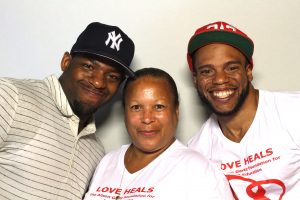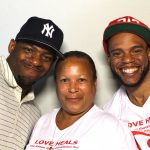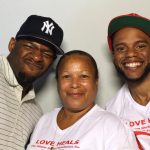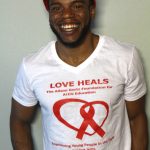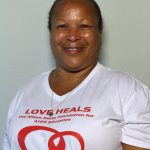Deborah Levine, Kareem Youngblood, and Jaron Cook
Description
Kareem Youngblood (31) and Jaron Cook (32) interview their colleague Deborah Levine (52) about what inspired her to work for Love Heals.Subject Log / Time Code
Participants
- Deborah Levine
- Kareem Youngblood
- Jaron Cook
Recording Locations
Lower Manhattan StoryBoothVenue / Recording Kit
Tier
Partnership
Partnership Type
OutreachInitiatives
Keywords
Subjects
Places
Transcript
StoryCorps uses Google Cloud Speech-to-Text and Natural Language API to provide machine-generated transcripts. Transcripts have not been checked for accuracy and may contain errors. Learn more about our FAQs through our Help Center or do not hesitate to get in touch with us if you have any questions.
00:04 Deborah Levine 52 June 25th, 2016 Manhattan New York and my relationship to these two gentlemen cream and Duran is I am the executive director of love heals and they are members of the staff.
00:27 Kareem Youngblood 31 June 25th, 2016 Manhattan, New York, New York City and my relationship to these guys.
00:40 Coworkers and facilitators
00:44 Jerome Cook age 32 June 25th 2016 location is New York and my relationship to these two people what to say so Korean co-facilitator and I'm going to say employee to love Hills. And is Deborah Levine?
01:10 Deborah I have the juicy question what's kept you in this line of work for so long?
01:23 That's a loaded question, but the short answer is that is
01:31 The Injustice meaning that from me HIV is a social justice issue. The fact that people can be discriminated against and tormented because of a virus.
01:52 Is what keeps me working and communities of color and the idea that I could possibly carry the voice of somebody who doesn't have a voice or doesn't feel like they have a voice.
02:07 That it's my job my role my responsibility the essence of who I am to be able to.
02:16 Create safe spaces for anyone to be able to freely Express who they are whether it is their gender pronoun or who they love for who they don't love but that for me has always been the critical issue. I think very early on I got to see in this epidemic
02:44 People dying with nobody by their side babies who were born
02:52 Both from substance abuse and to also contracted the virus from their parents who were left alone and that to me was intolerable.
03:05 So that's why I do what I do because
03:10 To whom much is given much is required.
03:13 And I've been fortunate enough to be given so it's my job and my Ministry and my love to be able to give back.
03:24 I like that have um, I remember when I first started it was like
03:30 I don't want to say them and I swore I sent them but it was the people who were positive and then the people working in the field who were negative and for a little bit of the time it felt like being negative like you didn't matter and the work like especially with Love Field in being a health educator. I remember my first presentation. I was with Asia Betancourt and we were it was World AIDS day and we were at Port Richmond High School in Staten Island, and it was five presentations back-to-back ordertorium. It was in this. Kareem and some little small classroom. It was just the right packed Auditorium. Here you go. And the first year there I felt like to give me to lunch. I feel like Solange and Asia was Beyonce like it was her show and I was just there to kick Jay-Z and that's how I felt like I didn't feel like I mattered
04:30 A long time to see that there was some some purpose in Indian hiv-negative and in the field, did you ever feel like you didn't matter as much but who are you couldn't do as much because of your status or anyting
04:47 So the truth of the matter is that I identify as being a heterosexual black woman and because of that I think a lot of times we are on the cusp, you know, we are not the ones who are positive. We don't necessarily fall into that whole LBGTQ community.
05:15 So yeah, there are times that you sometimes feel like you're the stranger in the room, but I think over time when I've learned is is that there's a place for all of us in this work and that being a heterosexual black woman means that I have the ability to share my story about how I've been able to stay negative.
05:44 And what it means for other people in my community who maybe haven't been as fortunate.
05:52 So yeah, it's learning when to step up and when to step back and I think
05:59 My old Mentor the Reverend doctor Preston Robert Washington Senior, who was the senior pastor of Memorial Baptist Church in Harlem, one of the first pastors to do this work.
06:13 Said to me very clearly that sometimes it's just about being the support and knowing your place and knowing when to step up and when to decrease to allow others to be able to tell their story and to do this work.
06:32 So after a while now, I felt like I was in the right place all the time because what I realized is that this is a story about our community and about all the fabric that it takes to make this community whole so whether I am on the stage with someone positive or another negative person, it's all about what we can convey across.
07:07 Who?
07:08 Lumos
07:12 I think there's been a lot of people I was fortunate enough to have grandparents who were very much loving people. My grandfather was profoundly deaf. So I think from a very early age it taught me to be much more sensitive to people who had differences.
07:39 My parents are of the thought that it's not about what's in your bank account. But what's in your heart. So I grew up around very diverse group of people who are socially conscious and who were Advocates and my parents always believe that if you had the ability to have the platform to speak then you had an obligation to do so and that Injustice is needed to be identified and addressed.
08:15 So I think from an early age, it's been a family and then as I grew as a professional it became people like dr. Washington and princesses seal who runs the balm in Gilead Deborah Frazier house who founded the national black leadership Commission on AIDS. These are the founders of this world who came before me and who cleared the path for me to be able to do work in the face Community one people said that the black church wasn't present in this work and I knew that we had pastors who trained to be HIV testers when houses of worship opened up their food pantries and said things like to whomsoever
09:05 That we weren't going to judge people based on their status or their sexuality. We just want to be able to feed folks.
09:14 So I think it's those folks who have come before me that have been the most instrumental in terms of how I think about this work. It's not a nicer them. It's all of us and but for the grace of God, it could have been me.
09:33 And that I need to clear a path for the people that are coming behind us.
09:40 My goddaughters
09:42 The young women that we work with the young men, we work with the ones who think that they're invisible because they're not gay where they're not straight or they're not clear about what their sexuality is or who they are.
09:58 So for me, I got my strengths from the facilitators from you guys. That's where I pull.
10:09 The love for this work it's being able to work with Sarah flowers. It's being able to watch innocent Saunders.
10:18 Do what she does with the facilitators in terms of training and cultivating its watching Phillip Hilton go after foundations that don't understand why we do what we do for the general population and not forcing young people to have to identify and him not backing down and staying but yes, we have a right and a responsibility to educate our young folks.
10:48 So I think there's a lot of different people and lots of different ways that have impacted.
10:55 Where I've gone in this work?
11:10 I fought this work very early on I worked initially as a psychiatric social worker with young children whose parents had to come to the virus either through substance abuse or some other means of transmission and nobody else really wanted to work with them. So I sort of became the specialist in working with them.
11:37 I moved on and worked for the City of New York and the office of health and mental health services working on the housing the New York New York agreement and again faced with a fact that young people coming out of foster care.
11:55 Who may have been either hiv-positive or at high risk? No one wanted to deal with them. So I ended up figuring out ways to house young people who weren't getting the same support through housing providers. So I thought I was done with this work and then I went to Harlem congregations for Community Improvement and they will like we have a scatter site housing program and we want you to manage it. And so I think that was when I really said, okay, I'm going to figure out how I'm going to make this work, but I think for me it was when I came out of grad school and I was studying for my LCSW and I met a gentleman by the name of George Parish Shelton.
12:46 Who instantly we developed a love for one another?
12:51 Gay men absolutely stunning and beautiful both women and men would fall in love with him. He was my Adonis. That's the only way I can describe him.
13:03 And we studied for the exam together and we ended up working together a Bronx-Lebanon Hospital in the child Clinic.
13:13 And about a year into us working together. He became very sick.
13:19 And was very much afraid to share the fact that he had been diagnosed hiv-positive except at the time. He had AIDS he had waited so long to get tested.
13:34 That he didn't have much longer to live and so visiting him in the hospital.
13:41 And recognizing that the nurses were afraid to touch him.
13:45 They didn't want to bathe them. They don't want to see them his family had some very mixed feelings about his sexuality. And so
13:57 With the consent of my parents. My mother said do what you got to do and I went and I bathed him and I said him and I stayed with him until he left us and that was when I knew that.
14:17 This was something that had to be done. It was not fair that people.
14:23 Because of a virus
14:26 Died by themselves
14:29 Didn't have anybody to love them didn't have anybody to hug.
14:35 That's unthinkable.
14:37 And it wasn't something that I was willing to let go.
14:42 So I think for me that was the pivotal point that said
14:48 Okay. Now what?
14:52 Tell Steve if it's crazy because like I remember hearing this thing. I always bring this up when I have the opportunity to but it's even ducks or geese right when they're flying and it'll V shape and one of them get shot or whatever and they fall down two geese or Ducks. I don't know which ones it is. They leave the formation and they go down with the decorative case until it passes away and then they catch up with the rest of them and they're they're birds and they they even have the compassion not to let another bird die alone in humans. We just had an intense fear is so much stuff that goes into making you I don't want to say ignorant but it is ignorant because it's not stupid is ignoring. You don't know or you refuse to find out because of fear and this is so
15:43 Yeah, but that's all I got to say for it. And if I can jump then I would definitely say that that's what keeping me in the work that I do. There's a lack of Education connected with the fear of not knowing I had a family member, you know second cousin who you know who is very influential in my life when I was growing up, you know, pick me up from school drove me around to my mom get off of work, you know femi White Castles and Pino make McDonald's and you know, it was like a father for me and I remember you know, because my family was an educated on, you know, his condition, you know, when he came around, you know, his skin was you know, he had dark marks on his body and you know, come to find out he keep water from a blood transfusion, but it was just more of the fact that you know having this person who was like a giant figure picking me up every day from school, you know, be around me.
16:43 And I was afraid I remember being young maybe 9 years old and I was afraid to hug him because I didn't want to touch the shores or you know, what he was scratches on his skin would feel like I'm daddy want to touch him, you know, and that all came from my family not knowing that you didn't catch, you know, you can't catch HIV from that way, you know, and then just nowadays is to come to find out when I still do groups, you know to hear young people still not know what HIV means they don't even know what the acronyms HIV stands for is. What scares me to still doing this work but the work itself is what inspires me to stay in it because it's it is fun to learn. You know, I can go to the New York State Department Health trainings that last 925 and I can actually have a good time being there, you know learning about the new medications that are out now, you know everything known about the protest that exists. This is what key
17:43 We here and it's unfortunate that there's not enough people in our field who do it just because they love the work who do it because they want to give something back and teach other people who don't necessarily see it as the chance to educate and have fun with a huge variety of people, you know, we beat each groups of four young people young men committed. Some of them are dogs, but you know what we did the boys group together me and Corrine, you know, it was fun. They had fun and they learned and hopefully, you know as they move forward in life. They make a decision that doesn't put them at risk for infection. But if they do happen to make the you know, you know, they do engage in an activity that puts the my resume do contract HIV. They know that they're not going to die. You know, that's the part of our job that makes me feel like you know, what no one is ever going to control what you do, but I understand that we gave you the knowledge.
18:43 And understand is that the end of the world no matter what happens in your life and it's funny you say that because there's something so exciting to watching young people and the light bulb go off. It's like you don't see the click girl and they just, you know, the possibilities and then when they were able to share it with their their peers and then they're able to go home and have these conversations with family members and you know, we see it when we do the parent groups or when the parents come to graduation and then like I could have never had this conversation I could have this is like a completely different child. It's not just about educating them about prevention around HIV its teaching the most leadership skills. It's learning how to advocate for yourself. It's learning how to advocate for your community. It's learning how to be able to go to a doctor and say like hey, I don't know if this is right or wrong.
19:43 I don't know if this is healthy or not. But like this is what's going on in is this part of my body and I can identify it. I can call it by the street name or I can call it by the scientific name but I have the skill set to be able to do that and the confidence to be able to go in and say this is what I need. This is what my community needs and this is how we think we're going to fix it cuz I think it's so much larger than just being able to verbalize what the concern is, but it's those critical thinking skills that we help young people find to be able to talk about with the solutions are and that to me is
20:24 What I see you guys at the facilitators watching you go through those sessions and seeing where you start and where you end and coming back so energized because you've been able to share those experiences with young people and one of the students recognize me if I owe you came to my school. That's cool. I'm a few times they were with a parent at night. They went off. I hope you ain't mad. But yeah, and then the parents come over and they talk in this one lady. She was so funny. Should I guess now he's trying to teach me everything about it. I. It's blue waffle real. I don't believe that's real off of that was so empowering and when you were talking about how I'll let you know, they take the skills and they use that I was like,
21:24 That's what empowerment is. It's a word that you're throwing around all the time. You've been power in this and that but I never really got the click until I did the program and then you just said what you said and I was like, oh that's empowerment. The 80s was crazy. I remember seeing I'm doing crazy things to my hand. But Erica to use the poor darn, you know, I'm from the hood. We don't have bubble bath you support Dawn and my bathtub for me and she always ran my bubble bath wasn't bubble Dawn dish detergent bath. She always ran it for me. And I would like my favorite thing to do. She used to bring my small TV and sit in the bathroom and I was just laying back. I want some grapes Erica great. It should come running with my grades and then Erica just disappeared. I didn't know what happened to her. I later found out that Erica had HIV and diabetes related complications.
22:24 But her daughter like I see her and I do the work for her daughter. Like I knew your mother you probably don't remember your mother running your bubble bath, but I remember your mother running my bubble bath and that's why I'm doing this. She has two kids and I'm like I want to talk to her and I can just like talkin about her know like this is what I do. And your mother is a big reason even Tamela who was upstairs. She passed away on the 4th of my building the guy next door. I lived in the hood in the 80s and the 90s were funerals a lot. I was born 1985 by 99th 1995. I think I went to a lot of funerals and not even know why I was there and it turned out they all died to a driver qualifications and it's sad is scary.
23:11 They paved the way for a lot of people they had to take medication that made them really sick. It was like I'm damned if I do and damned if I don't I'd rather not take this meds right now because it makes me feel better. And if this is the end I rather go out feeling better than Loop the office on medication and it was just scary and a different time and they the kids nowadays. They don't know that like we are the crack baby generation. My mother was a crack addict. I didn't have crack in my system when I was born but she left the hospital and went to cracked and I went from the hospital when a cat with Tamil is Mother the lady who died from HIV to the first floor with my grandfather and my mother was back on the streets right after the hospital. So like I could have been born with HIV. A lot of my friends was born with HIV and didn't make it. It was everywhere and Crown Heights Brooklyn everywhere. So I think that what we do changes lives.
24:11 It makes people better. Like Jaron was saying even though the boys know that you don't want HIV and we can't just keep it at don't get HIV don't get HIV don't get HIV statistics the world the truth is that at least one of them might is real high by Billy and what do they do? Because we didn't teach them what to do after that. So we taught them what to do after that. We don't want that to happen. But if this happened you need to be getting tested every three months if you having a lot of sex, if you get HIV you get on your medication you stay on your medication. You don't become resistant. You are empowered practice safe sex. They met Dorian. They know that someone can be born during almost 30 30 Days by HIV and look like Dorian J Pat. He looks great. Do you don't think when he walked in the room that Dorian is hiv-positive never thought it they see it they embraced him and they know that he's just like me he was born with it. He didn't make sexual.
25:10 Practice decisions or whatever to get the virus and I think they are stronger than ever before you can claim it on it.
25:22 It's with a Capital C.
25:25 Take care of that's what you guys do.
25:31 Thank you for the opportunity.
